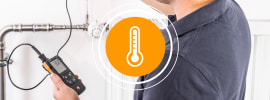The testo 477 LED stroboscope makes stunningly fast movements look as if they are taking place in slow motion. This allows you to check and inspect machines and systems while they are still running, and measure speeds of up to 300 000 rpm.
It is impossible to tell with the naked eye if the thread guide of a knitting machine is working properly. It therefore equally impossible to tell if there are any irregularities in vibration or rotational processes of machines or systems. But it’s a different story with the testo 477 LED stroboscope. That’s because the stroboscope emits a series of flashes which makes what you see appear as a “frozen image”.
The testo 477 LED stroboscope can also measure the rotational speed of very small and hard-to-reach objects. And because there’s no need for reflex marks, there’s no need to stop the machines and no disruption to production processes either.
LED stroboscope – technical features
An extremely high measurement range of up to 300 000 flashes per minute (fpm) and a very high illumination of up to 1 500 Lux allow you to carry out rotational speed measurements of up to 300 000 rpm. A trigger input and output ensure connectivity to external systems and control via an external sensor.
The LED stroboscope’s integrated impact protection and sturdy IP65 rated housing (which also allows it to be wiped down) ensure that the testo 477 can stand up to the rough and tumble of everyday use. And thanks to a longer battery operating time, you can carry out uninterrupted measurements for up to 5 hours.
What’s included
testo 477 LED stroboscope, carry case, trigger signal plug, calibration protocol, batteries.






























